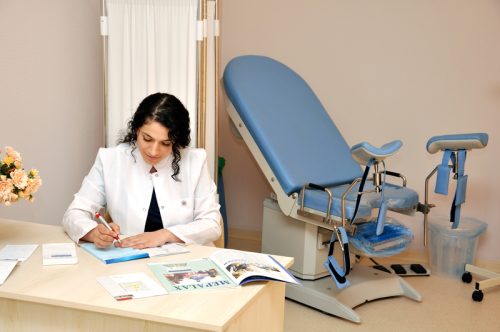PCOS is a common and frustrating women’s health concern. Symptoms can be very general or confusing, so checking for this condition can be difficult. While it can be hard to diagnose, it is estimated to affect 1 in every 10 women of childbearing age and can even affect young women as early as their first period.
So, if you are suffering from symptoms of PCOS, know that you are not alone!
Speak with your healthcare provider at Great City Medical if you are concerned you might have PCOS. But first, to help answer some of the health questions you may have, here is some information about PCOS and how it is diagnosed and treated.
What is PCOS?

Polycystic ovary syndrome or polycystic ovarian syndrome (PCOS) is a hormonal disorder in females caused by an imbalance of sex hormones. The disorder causes many small sacs of fluid, called cysts, to form on the ovaries. The cysts can be filled with immature eggs, preventing them from being released during ovulation in a regular menstrual cycle.
Therefore, common symptoms of PCOS include irregular menstrual cycles, long-lasting menstrual cycles, and infertility. Other common symptoms include unwanted hair growth including facial hair (also known as hirsutism), male pattern baldness or hair loss, acne, obesity, painful periods, abdominal bloating, and high levels of androgen (also known as “male hormones” but women also have them).
PCOS can be diagnosed at any age. Signs of PCOS can be apparent around a person’s first menstrual period, or they can first appear later in life.
Can a gynecologist check for PCOS?

Yes, a gynecologist can help you determine if you have PCOS. If you are concerned you might have PCOS or if you have any questions about the disorder, you can ask your ob/GYN at your next visit.
Unfortunately, there is not just a single test for the diagnosis of PCOS. A diagnosis can sometimes take many tests and may also require a referral to an endocrinologist (a hormone specialist). That said, talking to your obstetrics and gynecology provider is a great place to start.
How is PCOS Diagnosed?

To evaluate you for PCOS, your healthcare provider may start by asking you questions about your medical history. They’ll want to know more about your menstrual cycles, any symptoms you’ve experienced, if you’ve had any weight gain, any medications you are taking, any diagnosed medical conditions, and any family history of hormonal disorders.
Next, your doctor will likely perform a physical exam. The physical exam includes checking for signs of excess body hair growth or acne, and measuring metrics like your blood pressure and body mass index. A physical exam also includes a pelvic exam, where the doctor will apply pressure to the interior and exterior of the pelvic area to check your reproductive organs for any masses, growths, or abnormalities. If further physical examination is required, a transvaginal ultrasound can be used to examine the interior of the uterus, endometrium, and ovaries for any ovarian cysts or other signs of PCOS.
Blood tests are also commonly used to diagnose PCOS. Blood tests are used to check hormone levels (estrogen, progesterone, androgen) and insulin resistance (glucose or blood sugar levels).
For PCOS to be diagnosed, your doctor must detect three conditions:
- Menstrual cycle irregularies
- High levels of androgens
- Growths or enlargement of the ovaries
What are other complications of PCOS?
PCOS can increase your risk for other related health conditions, including thyroid problems, heart disease, high blood pressure, high cholesterol, endometrial cancer, endometrial hyperplasia, stroke, Type 2 diabetes, sleep apnea, depression, metabolic disorders, infertility, and more.
Obesity does not directly cause PCOS, but it has been shown to worsen the symptoms of PCOS, such as insulin sensitivity. Therefore, lifestyle changes and weight loss may help reduce the severity of PCOS symptoms.
PCOS can manifest in many ways and affect your overall health and wellbeing. Therefore, it is important to speak with a doctor to receive a diagnosis and medical treatment for PCOS so that you can take control of your overall health.
How is PCOS treated?
Unfortunately, there is currently no cure for PCOS. However, there are many solutions to treat the symptoms of PCOS and lessen the severity of the disorder. The appropriate treatment for PCOS depends on which symptoms are your primary concern.
If regulating your period is a primary concern, your doctor may prescribe hormonal birth control pills or progestin therapy.
If infertility is your primary concern, your doctor may prescribe medicines such as Clomiphene, Letrozole, Metformin, or Gonadotropins to help you ovulate and become pregnant. In Vitro fertilization (IVF) can also be effective for some patients with PCOS.
If unwanted hair growth and acne are your primary concerns, hormonal birth control pills, acne medications, or androgen-blocking medications or creams can be effective. While often temporary, hair removal treatments can also help with these symptoms.
Other effective treatments also include lifestyle changes such as eating a healthy diet, exercising more often, getting high-quality sleep, and losing weight.
Later in life, menopause has been shown to help balance hormone levels and reduce the severity of PCOS symptoms.
Things to consider with PCOS and hormonal birth control
If you are currently taking hormonal birth control, such as oral contraceptives (birth control pills), it can be hard to accurately measure your body’s natural hormone levels. Hormonal birth control can also cause light or infrequent periods. This can make it difficult for your doctor to diagnose PCOS accurately.
Therefore, you may be required to stop taking any hormonal birth control for several months if you think you might have PCOS. That way your doctor can routinely and accurately monitor your hormone levels and menstrual period cycle.
Of course, birth control pills are a common treatment for PCOS symptoms, so your doctor may ultimately re-prescribe this medication if you are ultimately diagnosed.
Make an appointment with your ob/GYN today
We take women’s health issues like PCOS seriously at Great City Medical. We understand that PCOS symptoms and diagnosis can be a long, frustrating journey.
But don’t worry—our trained medical professionals are here to help you get the answers you need so that you can look and feel your best.
Call our New York City gynecologist offices today to make an appointment to speak with our health professionals.



